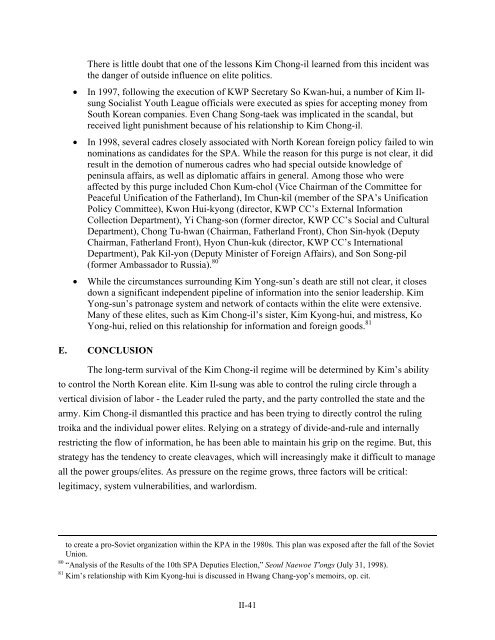North Korean Policy Elites - Defense Technical Information Center
North Korean Policy Elites - Defense Technical Information Center
North Korean Policy Elites - Defense Technical Information Center
You also want an ePaper? Increase the reach of your titles
YUMPU automatically turns print PDFs into web optimized ePapers that Google loves.
There is little doubt that one of the lessons Kim Chong-il learned from this incident was<br />
the danger of outside influence on elite politics.<br />
• In 1997, following the execution of KWP Secretary So Kwan-hui, a number of Kim Ilsung<br />
Socialist Youth League officials were executed as spies for accepting money from<br />
South <strong>Korean</strong> companies. Even Chang Song-taek was implicated in the scandal, but<br />
received light punishment because of his relationship to Kim Chong-il.<br />
• In 1998, several cadres closely associated with <strong>North</strong> <strong>Korean</strong> foreign policy failed to win<br />
nominations as candidates for the SPA. While the reason for this purge is not clear, it did<br />
result in the demotion of numerous cadres who had special outside knowledge of<br />
peninsula affairs, as well as diplomatic affairs in general. Among those who were<br />
affected by this purge included Chon Kum-chol (Vice Chairman of the Committee for<br />
Peaceful Unification of the Fatherland), Im Chun-kil (member of the SPA’s Unification<br />
<strong>Policy</strong> Committee), Kwon Hui-kyong (director, KWP CC’s External <strong>Information</strong><br />
Collection Department), Yi Chang-son (former director, KWP CC’s Social and Cultural<br />
Department), Chong Tu-hwan (Chairman, Fatherland Front), Chon Sin-hyok (Deputy<br />
Chairman, Fatherland Front), Hyon Chun-kuk (director, KWP CC’s International<br />
Department), Pak Kil-yon (Deputy Minister of Foreign Affairs), and Son Song-pil<br />
(former Ambassador to Russia). 80<br />
• While the circumstances surrounding Kim Yong-sun’s death are still not clear, it closes<br />
down a significant independent pipeline of information into the senior leadership. Kim<br />
Yong-sun’s patronage system and network of contacts within the elite were extensive.<br />
Many of these elites, such as Kim Chong-il’s sister, Kim Kyong-hui, and mistress, Ko<br />
Yong-hui, relied on this relationship for information and foreign goods. 81<br />
E. CONCLUSION<br />
The long-term survival of the Kim Chong-il regime will be determined by Kim’s ability<br />
to control the <strong>North</strong> <strong>Korean</strong> elite. Kim Il-sung was able to control the ruling circle through a<br />
vertical division of labor - the Leader ruled the party, and the party controlled the state and the<br />
army. Kim Chong-il dismantled this practice and has been trying to directly control the ruling<br />
troika and the individual power elites. Relying on a strategy of divide-and-rule and internally<br />
restricting the flow of information, he has been able to maintain his grip on the regime. But, this<br />
strategy has the tendency to create cleavages, which will increasingly make it difficult to manage<br />
all the power groups/elites. As pressure on the regime grows, three factors will be critical:<br />
legitimacy, system vulnerabilities, and warlordism.<br />
to create a pro-Soviet organization within the KPA in the 1980s. This plan was exposed after the fall of the Soviet<br />
Union.<br />
80 “Analysis of the Results of the 10th SPA Deputies Election,” Seoul Naewoe T'ongs (July 31, 1998).<br />
81 Kim’s relationship with Kim Kyong-hui is discussed in Hwang Chang-yop’s memoirs, op. cit.<br />
II-41













